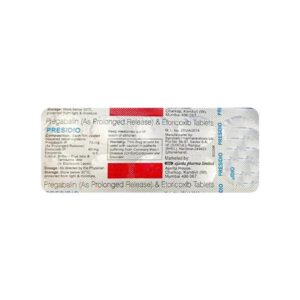ETORICOXIB + PREGABALIN
Etoricoxib: Etoricoxib is a nonsteroidal anti-inflammatory drug (NSAID) that is used to relieve pain and inflammation associated with various conditions such as osteoarthritis, rheumatoid arthritis, ankylosing spondylitis, and acute gouty arthritis.
Its mechanism of action involves selectively inhibiting the enzyme cyclooxygenase-2 (COX-2). COX-2 is responsible for the production of prostaglandins, which are involved in pain and inflammation. By inhibiting COX-2, etoricoxib reduces the production of these prostaglandins, thereby relieving pain and inflammation.
The recommended dose of etoricoxib varies depending on the condition being treated. For osteoarthritis, rheumatoid arthritis, and ankylosing spondylitis, the usual dose is 60 mg once daily. For acute gouty arthritis, a loading dose of 120 mg is recommended followed by a maintenance dose of 60 mg once daily for up to 8 days.
Like all medications, etoricoxib may cause side effects. Common side effects include headache, dizziness, gastrointestinal disturbances (such as indigestion, stomach pain, nausea), and fluid retention. Rare but serious side effects can occur, such as gastrointestinal bleeding, liver toxicity, and cardiovascular events (such as heart attack or stroke). It is important to follow the prescribed dose and duration of treatment and consult a healthcare professional if any side effects occur.
Pregabalin: Pregabalin, sold under the brand name Lyrica, is a medication used to treat several conditions, including epilepsy, neuropathic pain (chronic pain caused by damaged nerves), fibromyalgia, and generalized anxiety disorder (GAD).
Pregabalin works by binding to calcium channels in the central nervous system, which reduces the release of certain neurotransmitters involved in pain signaling. This helps to decrease abnormal electrical activity in the brain and spinal cord, providing relief from seizures, neuropathic pain, and other related conditions.
The dose of pregabalin varies depending on the condition being treated. For epilepsy, the recommended starting dose is usually 75-150 mg taken two or three times a day. The dose can be increased to a maximum of 600 mg per day, depending on individual response and tolerance. For neuropathic pain and fibromyalgia, the initial dose is usually 75 mg taken twice a day, which can be increased to 300-450 mg per day if necessary. In cases of GAD, the recommended starting dose is 150 mg taken once daily, which can be increased up to 300 mg per day if needed.
Common side effects of pregabalin may include drowsiness, dizziness, dry mouth, blurred vision, weight gain, and problems with coordination. Other potential side effects can include headache, constipation, nausea, and swelling of the hands, feet, or ankles. Some individuals may experience more severe side effects such as allergic reactions, mood changes, or difficulty breathing. It is important to consult a healthcare professional for a comprehensive list of possible side effects and to report any concerning symptoms.


